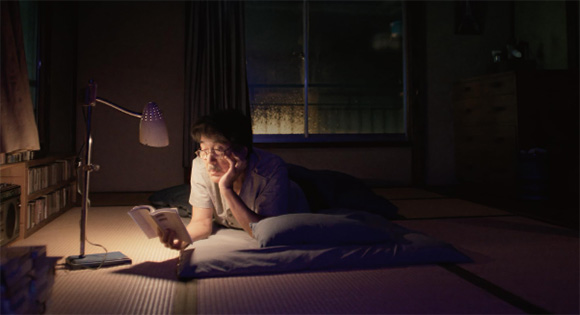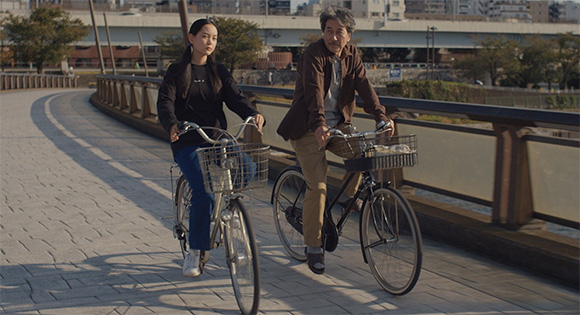
[ad_1]
“Only a good day
Drink Sangria within the park
Then later, when it will get darkish
We go house“Only a good day
Feed animals within the zoo,
Then later, a film too
After which house“Oh, it is such an ideal day
I am glad I spent it with you
Oh only a good day
You simply maintain me hanging on
You simply maintain me hanging on”
— “Good Day” by Lou Reed
What would an ideal day be like for you? Would you go on an journey? Would you spend it with a particular particular person? Would you be at work or at house? Would you do one thing new or stuff you at all times do?
That is the query on the coronary heart of Good Days, a drama directed by German filmmaker Wim Wenders (Wings of Want) from a script written by Wenders and Takuma Takasaki. The movie competed on the 2023 Cannes Movie Competition the place it gained the Prize of the Ecumenical Jury (the movie that greatest touches the non secular dimension of our existence) and the Greatest Actor Award for Koji Kakusho’s luminous efficiency. It has been nominated for Greatest Worldwide Movie within the 2024 Academy Awards.
Because the world opened up once more after the pandemic, Wenders was invited to Japan to see the Tokyo Rest room Undertaking, through which Japanese public bogs had been redesigned in 17 areas with the assistance of 16 creators invited from world wide. The producers envisioned that Wenders would make a brief movie about every facility. However he noticed one thing else within the mission – a chance to inform the story of one of many staff, unusually unseen and unacknowledged, who work in public areas.

His focus within the ensuing drama is Hirayama (Koji Yakusho), a cleaner of public bogs. His 14 “good days” are stuffed with easy routines. Upon awakening, he folds up his mattress and places it away. He brushes his enamel, trims his mustache, shaves, washes his face, and mists his vegetation. He attire in a jumpsuit with The Tokyo Rest room on the again. Opening the door from his small house, he smiles on the sky. Then he will get some espresso from a dispenser. In his equipment-laden van, he performs a cassette music tape.
Throughout his shift at a number of bogs, his work is meticulous. He washes down all of the fixtures and makes use of just a little mirror to test that he has gotten any filth from below the bathroom. If somebody is available in, he steps out and patiently waits for them to complete.
At lunchtime, he goes to a park the place he takes an image of the glowing leaves of a favourite tree. Later, we be taught he has packing containers of those photos, all labeled by yr. He finds a small sapling and digs it up so as to add to his plant assortment at house. He acknowledges a homeless man hugging bushes.
After work he rides his bike to a bathhouse. After that respite, he goes to a favourite restaurant for dinner. At house he reads earlier than falling asleep.
“Somebody as soon as requested His Holiness the Dalai Lama, ‘In case you solely had one phrase to explain the key of happiness, and of dwelling a satisfying and significant life, what would that be?’ With out hesitating the Dalai Lama replied, ‘Routines.’ “
— Marc Lesser in Much less
Days are separated from different days by a sequence of summary dream photos, capturing key moments he has simply skilled. (These had been created by Donata Wenders.)
Most days Hirayama has to cope with a younger and irresponsible colleague (Tokio Emoto) who needs him to promote his cassettes so he can have the cash to woo a woman (Aoi Yamada). She is extra thinking about his tape of Patti Smith’s music than the boy. Someday he visits a shrine. One other day he goes to a second-hand bookstore so as to add to his giant assortment of paperbacks.
“Benefit from the little issues, for sooner or later chances are you’ll look again and notice they had been the large issues.”
— Robert Brault, American author
Hirayama’s routine adjustments when his niece Niko (Arisa Nakano) exhibits up; {the teenager} has run away from house. She goes to work with him and confides a few of her emotions. Driving their bikes over a bridge, he reminds her that “Subsequent time is subsequent time. Now’s now.” She makes the phrases right into a chant.

That chant captures rather a lot about Hirayama. He’s all about being current. Along with his small Buddha-like smile, he acknowledged all the pieces round him – his vegetation, the sky, the bushes, the visitors, the patrons of the bogs, just a little boy who’s misplaced within the park, acquaintances at a restaurant, his books. We be taught from an end-card on the movie, that when he takes his tree photos, he capturing “Komorebi, the shimmering of sunshine and shadow that’s created by leaves swaying within the wind. It solely exists as soon as, at that second.”
“The best way of the small instructs us to personal our smallness by preserving our eyes on the celebs however our toes on the bottom.”
— Michael Gellert in The Method of the Small
In different methods as effectively, Hirayama is an exemplar of on a regular basis spirituality, particularly within the some ways he focuses on the small and little issues that give life which means. He pays consideration to the main points of his cleansing work, his vegetation, and his house. Every thing has its place. He appreciates magnificence, particularly within the bushes, but additionally within the melodies and lyrics of the music he loves. He’s form. Discovering just a little boy in one of many bogs, he takes him to his mom. On the bathhouse on a sizzling day, he followers an previous man sleeping within the ready room. He clearly loves his niece and, regardless of being a person of few phrases, he enjoys her firm. He nurtures himself with music and books and Niko by listening to her considerations. And he performs. He performs tic-tac-toe with an nameless customer to one of many bogs. He meets a person with most cancers they usually have interaction in a sport of Shadow Tag.
In comparison with “motion films” or “relationship trauma” movies, not a lot occurs in “Good Days.” And that’s simply good. In the previous couple of minutes, Hirayama is driving to his first job of the day. Nina Simone’s “Feeling Good” is enjoying from the tape deck. In an appearing tour de power that invitations your personal participation, the digital camera focuses on his face and the various feelings he’s feeling. “It’s a brand new daybreak” . . . sure . . . “It’s a brand new day” . . . sure . . . “It’s a brand new life for me” . . . sure . . . “And I’m feeling good” . . . YES!
[ad_2]